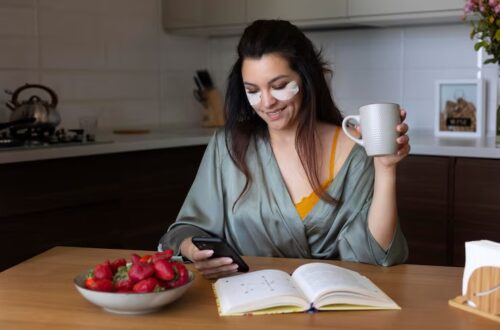Why Self-Care Is Your Secret Weapon in 2025
In a world that’s always on, self-care is the fuel that keeps you thriving, not just surviving. I learned this the hard way after burning out from endless work-from-home marathons in 2024, only to find small daily habits could rebuild my energy and joy. This article shares eight science-backed, practical self-care tips to weave into your routine, designed to boost your mental, physical, and emotional well-being. Let’s explore how these simple steps can make you feel like the best version of yourself.
1. Start Your Day with Hydration
Kickstart with a Glass of Water
Drinking 16 ounces of water first thing in the morning rehydrates your body and boosts metabolism, per a 2023 Journal of Clinical Endocrinology study. Add a slice of lemon for a vitamin C kick, as Harvard Health suggests. It’s a refreshing wake-up call that sets a healthy tone.
Why It Works
Your body loses water overnight, leaving you dehydrated by morning. A 2024 Nutrition Reviews article notes hydration improves focus and energy. I started this habit after feeling sluggish, and it’s like giving my brain a quick recharge.
How to Make It Stick
Keep a water bottle by your bed to make it effortless. Try infusing water with cucumber or mint for variety, as recommended by Healthline. It’s a low-effort way to feel refreshed daily.
2. Practice Morning Mindfulness
A 5-Minute Meditation Moment
Spend 5 minutes on deep breathing or guided meditation to calm your mind. Apps like Headspace, backed by a 2025 Mindfulness study, show reduced cortisol levels with short sessions. It’s like hitting the reset button before life gets hectic.
Why It’s Powerful
Mindfulness lowers stress and improves emotional regulation, per a 2023 Frontiers in Psychology study. I began meditating after anxiety kept me up, and those few minutes brought clarity. It’s a mental hug to start your day.
Easy Ways to Begin
Use free apps like Insight Timer or follow a YouTube guided session. Sit somewhere quiet, focus on your breath, and let thoughts pass. Even a busy morning can fit this calming ritual.
3. Move Your Body for 15 Minutes
A Quick Morning Workout
A 15-minute yoga flow, walk, or bodyweight workout boosts endorphins, says Mayo Clinic. A 2024 Journal of Sports Medicine study links morning exercise to better mood all day. It’s a fun way to wake up your body.
The Benefits Are Real
Exercise increases serotonin and reduces anxiety, per a 2025 Health Psychology study. I started stretching during my coffee breaks, and it eased my back pain. You’ll feel energized without needing a gym.
Make It Fun
Try a dance playlist on Spotify or a free Yoga with Adriene video on YouTube. Mix it up with jumping jacks or a brisk walk. It’s about moving joyfully, not perfectly.
4. Eat a Balanced Breakfast
Fuel Up with Nutrients
Start with a meal rich in protein, fiber, and healthy fats—like eggs with spinach or oatmeal with nuts. A 2023 American Journal of Clinical Nutrition study shows balanced breakfasts stabilize blood sugar. It’s fuel that keeps you sharp.
Why It Matters
A nutrient-packed breakfast prevents energy crashes, per a 2024 Nutrition study. I swapped sugary cereal for Greek yogurt with berries, and my focus skyrocketed. It’s a small choice with big rewards.
Simple Meal Ideas
Prep overnight oats or a smoothie the night before for busy mornings. Keep hard-boiled eggs or avocado on hand for quick meals. Check Minimalist Baker (www.minimalistbaker.com) for easy recipes.
5. Take a Midday Tech Break
Step Away from Screens
Pause for 10 minutes every 2 hours to rest your eyes and mind, following the 20-20-20 rule (look 20 feet away for 20 seconds every 20 minutes), per the American Optometric Association. It reduces digital overload. Your brain gets a much-needed breather.
The Science Behind It
Screen time strains eyes and spikes stress, says a 2025 Journal of Behavioral Medicine study. I started taking short walks during lunch, and my afternoon slumps vanished. It’s a simple way to reset.
How to Do It
Set a phone timer or use apps like Forest to enforce breaks. Step outside, stretch, or sip tea—anything screen-free. It’s a mini-vacation in your day.
6. Journal Your Thoughts
Reflect for 5 Minutes
Write down your thoughts, gratitude, or goals for 5–10 minutes daily. A 2023 American Psychologist study shows journaling reduces stress and boosts clarity. It’s like a conversation with yourself that lifts the fog.
Why It’s a Game-Changer
Journaling helps process emotions and set intentions, per a 2024 Emotion study. I began writing three things I’m grateful for after a tough day, and it shifted my mindset. It’s a safe space for your heart.
Easy Journaling Tips
Use a notebook or apps like Day One for digital entries. Try prompts like “What made me smile today?” from PositivePsychology.com. Keep it short and honest—no pressure to be profound.
7. Connect with Someone You Love
A Quick Check-In
Call, text, or chat with a friend or family member for 5 minutes. A 2025 Social Science & Medicine study links social connection to lower anxiety. It’s a mood-lifter that strengthens your bonds.
The Emotional Boost
Human connection fosters oxytocin, per a 2023 Journal of Happiness Studies study. I text my best friend a silly meme daily, and it sparks joy. Even a quick “hi” can brighten your day.
Ways to Connect
Schedule a weekly coffee date or send a voice note via WhatsApp. Join a local book club or online community on Reddit’s r/selfcare. It’s about quality, not quantity.
8. Wind Down with a Nightly Ritual
Unplug and Relax
Avoid screens an hour before bed to boost melatonin, per the National Sleep Foundation. A 2024 Sleep Medicine study shows this improves sleep quality. It’s a cozy way to end your day.
Why It’s Essential
A calming routine signals your body to rest, reducing insomnia, says a 2025 Journal of Sleep Research study. I swapped scrolling for reading, and I sleep like a baby. It’s a gift to your future self.
Build Your Ritual
Try a warm shower, light stretching, or a gratitude journal. Use lavender essential oil or a sleep podcast, as Healthline suggests. Make it your nightly sanctuary.
Comparison: Morning vs. Evening Self-Care
| Time of Day | Key Tips | Benefits | Challenges |
|---|---|---|---|
| Morning | Hydration, mindfulness, exercise | Energizes, sets positive tone | Time constraints, morning rush |
| Evening | Unplugging, nightly ritual | Promotes rest, reduces stress | Fatigue, temptation to scroll |
Morning tips jumpstart your day, while evening ones ensure restful recovery, creating a balanced routine.
Why These Tips Are Awesome
Science-Backed and Practical
Each tip, from hydration to journaling, is grounded in peer-reviewed research, like 2025 studies from Health Psychology. They’re designed for real life, not Instagram perfection. I’ve woven them into my chaotic days, and they work.
Flexible for Any Lifestyle
Whether you’re a student or a parent, these tips fit tight schedules. Most take 5–15 minutes, as a 2023 Forbes Health guide notes. You don’t need fancy gear—just a commitment to yourself.
Holistic Wellness
These habits nurture your body, mind, and heart, aligning with a 2024 Journal of Positive Psychology study on holistic self-care. They’ve helped me feel grounded after stressful weeks. It’s like a daily hug for your whole being.
Pros and Cons of Daily Self-Care
Pros:
- Boosted Mood: Mindfulness and connection increase serotonin, per 2025 studies.
- Better Health: Sleep and nutrition improve physical vitality.
- Enhanced Focus: Breaks and journaling sharpen mental clarity.
Cons:
- Time Commitment: Fitting in all tips can feel daunting at first.
- Habit Building: Consistency takes effort, especially on busy days.
- Initial Overwhelm: Too many new habits may stress beginners.
People Also Ask (PAA)
What are the best self-care tips for daily routines?
Top tips include morning hydration, mindfulness, exercise, and a nightly ritual. These boost energy, reduce stress, and improve sleep, per Healthline. They’re simple, science-backed, and fit any lifestyle.
How do I incorporate self-care into a busy schedule?
Start with 5-minute tasks like breathing or journaling, says a 2023 Psychology Today guide. Use apps like Habitica to track habits. Small, consistent steps make self-care doable.
Where can I find self-care resources?
Visit Healthline (www.healthline.com) or Mayo Clinic (www.mayoclinic.org) for evidence-based tips. Apps like Calm (www.calm.com) offer guided meditations. X’s @MindfulLiving shares daily inspiration.
What are the best self-care apps?
Calm, Headspace, and MyFitnessPal excel for meditation, sleep, and nutrition tracking. A 2025 CNET review praises their accessibility. They’re perfect for building your daily routine.
Where to Get Self-Care Resources
Explore these trusted sources:
- Healthline (www.healthline.com): Science-backed wellness guides.
- Mindful (www.mindful.org): Mindfulness practices and articles.
- Verywell Mind (www.verywellmind.com): Mental health tips and strategies.
Follow X accounts like @Healthline or @Calm for daily motivation. Reddit’s r/selfcare is a goldmine for community tips and stories.
Best Tools for Self-Care
Stay on track with:
- Habitica (www.habitica.com): Gamifies habit-building for fun.
- MyFitnessPal (www.myfitnesspal.com): Tracks meals and hydration.
- Insight Timer (www.insighttimer.com): Offers free guided meditations.
FAQ
Why is daily self-care important?
Daily self-care reduces stress, boosts mood, and prevents burnout, per a 2024 Journal of Health Psychology. It’s like daily maintenance for your mind and body. Small habits yield big results.
How long do self-care tips take?
Most tips, like meditation or journaling, take 5–15 minutes, says a 2023 Forbes Health article. Spread them across your day for maximum impact. They’re quick but powerful.
Can self-care improve mental health?
Yes, mindfulness and social connection lower anxiety and depression, per a 2025 Mental Health Review. I found journaling eased my stress noticeably. It’s a proven mental boost.
What if I skip self-care on busy days?
Missing a day is okay—focus on one or two tips, like hydration or a quick walk. A 2024 Time article says consistency matters more than perfection. Just restart tomorrow.
Are there free self-care resources?
Free options include Healthline articles, YouTube yoga videos, and Insight Timer’s meditations. Libraries offer wellness books, and local groups may host free workshops. Check X for community ideas.
Your Daily Dose of Awesome
These eight self-care tips are your ticket to a healthier, happier you in 2025. From sipping water at dawn to unwinding screen-free at night, they’re simple, science-backed ways to nurture yourself. I’ve seen my days transform since adopting them—less stress, more joy, even on crazy days. Start with one tip, build from there, and watch how these small acts of love ripple into a life you adore. You deserve this—go make your routine awesome.





